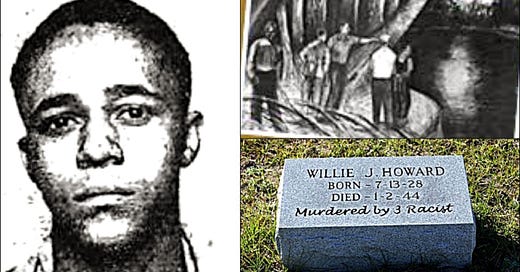The book "Caste: The Origin of Our Discontents” by author Isabel Wilkerson is a powerful and moving exploration of the American caste system. It offers a story that needs to be told and retold, so that we can never forget the dark chapters of our history and work to create a more just and equitable society for all.
In a excerpt presented in the book Caste, Wilkerson recounts the stunning story of Willie James Howard, a young Black man who was brutally lynched in Mississippi in 1945.
Howard, born on July 13, 1928, was an ordinary teenager who was victimized after an extraordinary act of kindness. In the winter of 1943, as Christmas approached, the youngster decided to spread cheer by giving Christmas cards to his co-workers at the Van Priest Dime Store. Among those recipients was Cynthia Goff, a white girl who worked alongside him.
Sadly, this simple act of goodwill would set in motion a chain of events that would end in his brutal and unjustified death. The girl, offended by the Christmas card and a subsequent letter from Willie on New Year's Day, turned to her father, A. P. "Phil" Goff, for guidance.
It’s here where Goff’s father, not only the Live Oak postmaster but also a former state legislator, took it upon himself to address what he perceived as a grievous offense.
In a chilling act of racial violence, Goff, along with accomplices S. B. McCullers and Reg H. Scott, allegedly went to Willie's home. Armed and fueled by prejudice, they forcibly removed the terrified youth from his mother.
The group then embarked on a macabre journey to the Suwannee River, east of Suwannee Springs. As Wilkerson tells the story in her book:
“The next day, the girl’s father and two other white men dragged Willie James and his father to the banks of the Suwannee River. They hog-tied Willie James and held a gun to his head. They forced him to jump and forced his father at gunpoint to watch him drown. Held captive and outnumbered as the father was, he was helpless to save his only child.”
The father James Howard, broken by the loss of his son, initially signed the same affidavit but later recanted after relocating to Orlando. The tireless efforts of Harry T. Moore, a prominent figure in the NAACP, led to a federal investigation after a county grand jury failed to indict anyone involved. However, justice remained elusive, and Goff, McCullers, and Scott escaped murder charges.
Despite the gravity of this crime and its glaring racial motivations, the case of Willie James Howard was never fully reopened or investigated under the Emmett Till Unsolved Civil Rights Crime Act. It stands as a grim reminder of the pervasive racism and violence that plagued the Jim Crow South.
The lynching of Willie James Howard was a horrific act of racial violence that left an indelible mark on the community. It was a stark reminder of the deep-seated racism and brutality that pervaded American society at the time. Wilkerson's account of this tragedy serves as a powerful indictment of the caste system that has shaped American history, and it continues to resonate with readers today.
In the book "Democracy Abroad, Lynching at Home: Racial Violence in Florida," author Tameka Bradley Hobbs, offers a poignant exploration of the contrast between the United States' promotion of democracy abroad and the simultaneous perpetration of racial violence domestically, particularly in Florida. The book delves into several cases of racial violence, but it is especially notable for its detailed account of the lynching of Willie James Howard.
Willie James Howard's case, which occurred in Live Oak, Florida, in 1944, is emblematic of the era's racial tensions and injustices. This tragic event serves as a central point in Hobbs' argument, illustrating the stark discrepancy between America's international image as a beacon of freedom and democracy and the harsh reality of racial oppression and violence within its own borders.
In the end, Hobbs’ book is another sobering reminder of the complexities of American history, especially regarding race relations and the long-lasting impacts of these historical events.







Caste is such an important book. It really should be required reading, in my opinion, especially for anyone in the United States. (also Michelle Alexander’s The New Jim Crow) But I have to confess it took me a long time to get through it. I’m a slow reader anyway, and the relentless reality here is not easy to digest. Every interview I’ve ever seen (or heard) Elizabeth Wilkerson do has been outstanding. I still need to go back and read The Warmth of Other Suns.
Wilkerson’s books are so riveting and simultaneously so difficult to read. I read the bits in CASTE about Black Americans in WWI to my World History students. I’d forgotten the story you highlight here, so I’ll have to go back and reread The Warmth of Other People’s Sons.